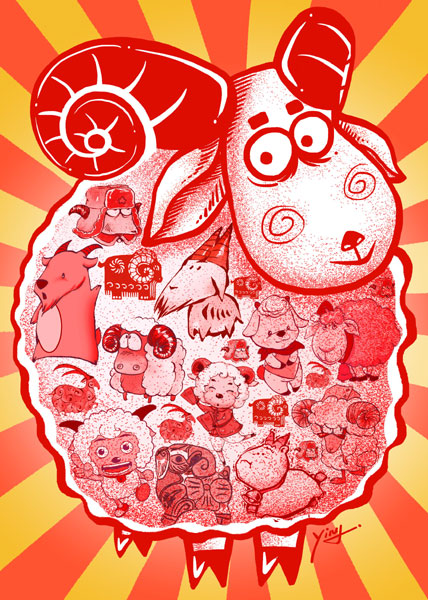Being 'Yang' at heart not all bad
Updated: 2015-02-13 07:56
By Raymond Zhou(China Daily)
|
||||||||
 |
|
[Photo by Wang Xiaoying/China Daily] |
The sheep, the zodiac animal of 2015, may be easily led astray, literally or figuratively. But in Chinese folklore, it inspires by its spirit of self-sacrifice and its association with fending off hunger.
When I first ordered mutton for my daughters at a restaurant, I feared it might be a traumatizing experience for them. They have been fed a steady diet of the cartoon series mistakenly titled Pleasant Goat and Big Big Wolf. What would they feel if they found out they were chowing down on their favorite character?
Not bad, as it turned out. They just shrugged and kept gobbling it up.
Arguably China's most popular television cartoon, which has spawned a wide array of merchandise, Pleasant Goat and Big Big Wolf features a lovable cadre of sheep, humorously named after Chinese homonyms. In Chinese, the sound yang can refer to one of dozens of different words, each with its own meaning and forming even more variations when coupled with other words. Thus, the male lead is called Xiyangyang, meaning happy or cheerful, with nothing to do with the ovine animal if not spelt out, and the female lead Meiyangyang being the equivalent of Minnie to Xiyangyang's Mickey.
There doesn't seem to be a goat in the series, to the possible confusion of English speakers. The Mandarin word for goat is shanyang, literally mountain sheep. In my hometown on eastern China's plains with their web of canals and lakes, the default breed is huyang, or lake sheep. And we call lamb xiaoyang, small sheep. Unimaginative, isn't it, compared with specialized words like ram or wether (a castrated sheep).
There is a respected Chinese company with a long history of advertising its wool products by saying yang three times, in a child's voice. It's a cute way of reminding customers of the origin and quality of their wool. In 2008, it launched another campaign in which the other 11 zodiac animals were pronounced in the same way. The result was disastrous. While the public loved "sheep sheep sheep", they hated "pig pig pig" or "cow cow cow". It simply did not work as childish patter.
Chinese share with other cultures one major symbolic meaning of sheep, which is the characteristic of timidity or docility. While pigs, hardly adorable in the Chinese eye, put up a fight when slaughtered, sheep hardly utter a sound when shepherded to their fate. But the Christian connotation of sheep and lamb has not spilled over into the mainstream. The herd mentality of the animal, however, is acknowledged in the Chinese word for herd or mass, qun.
The Chinese word for shepherd is more often associated with the cow than with sheep. The archetypal image of a Chinese shepherd boy is one sitting on the back of a cow and roaming a rice paddy, widely different from the cowboy of the American West. The most famous Chinese shepherd who survived by herding sheep was not a child, but an emissary assigned to the northern nation of the Hun. Su Wu (140-60 BC) was detained by the Hun, but he refused to betray his own country. As a punishment, he was exiled to the grassland to be a shepherd. He did it for 19 years before he was released to return to his homeland. Now he is an icon of patriotism.

 Clown therapy for sick children
Clown therapy for sick children
 Top 10 box-office countries in 2014
Top 10 box-office countries in 2014
 Spring Festival reception held in Vancouver
Spring Festival reception held in Vancouver NC slayings spark Muslim outcry
NC slayings spark Muslim outcry
 Chinese navy officers find value in US visit
Chinese navy officers find value in US visit
 Consul general weighs in
Consul general weighs in
 10 destinations favored by Chinese property investors
10 destinations favored by Chinese property investors
 Spring Festival goods in the making
Spring Festival goods in the making
Most Viewed
Editor's Picks

|

|

|

|

|

|
Today's Top News
Car crashes into US Consulate in Shanghai
China plans quality growth, anti-graft drive in 2015
US must help to safeguard cyber security, Beijing says
Obama seeks new war powers
US has 'risen to the challenge' of fighting Ebola
Obama asks Congress to authorize military force against IS
NYC police officer charged in stairwell shooting
Investors shifting focus in global realty purchases
US Weekly

|

|








